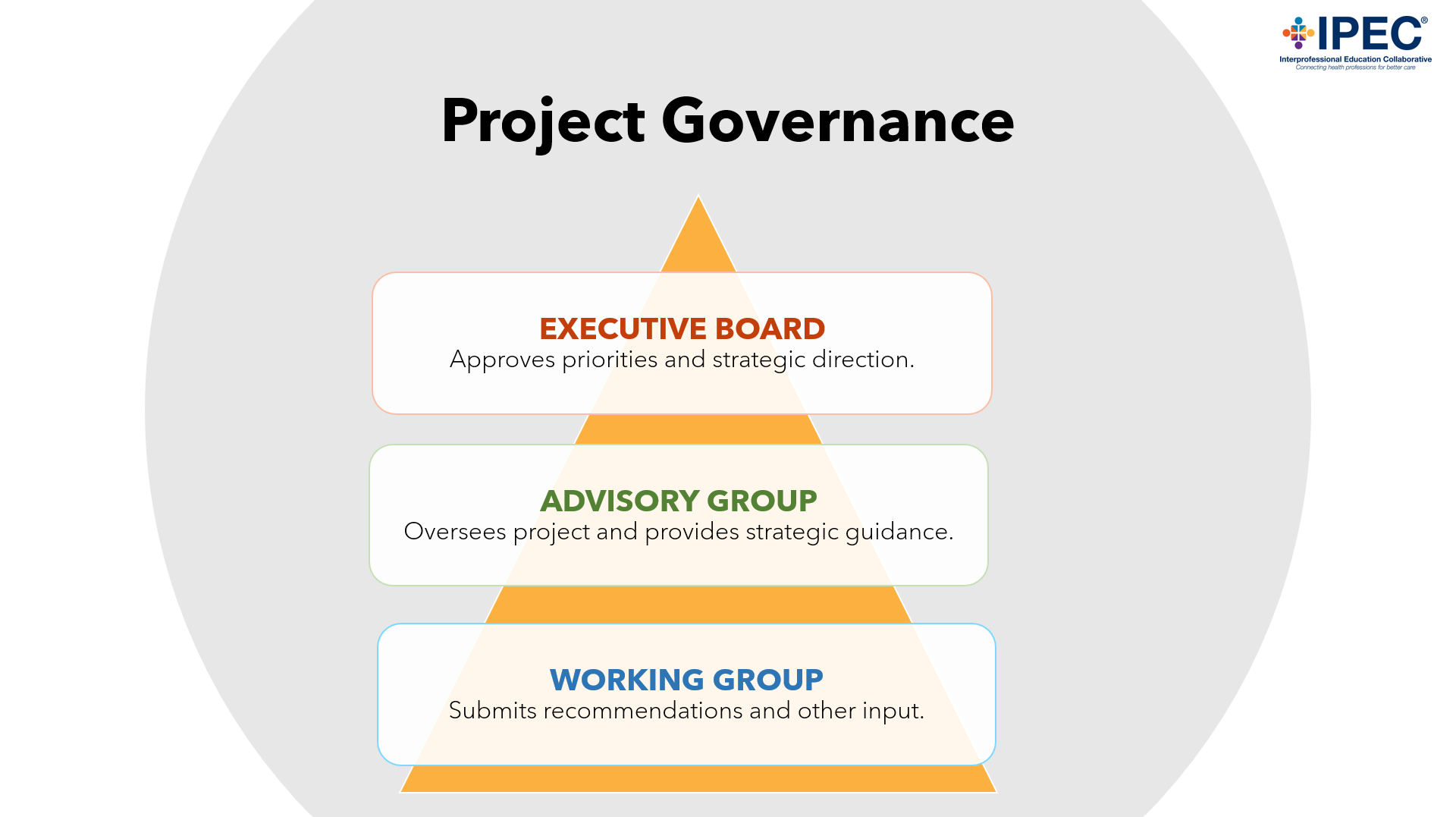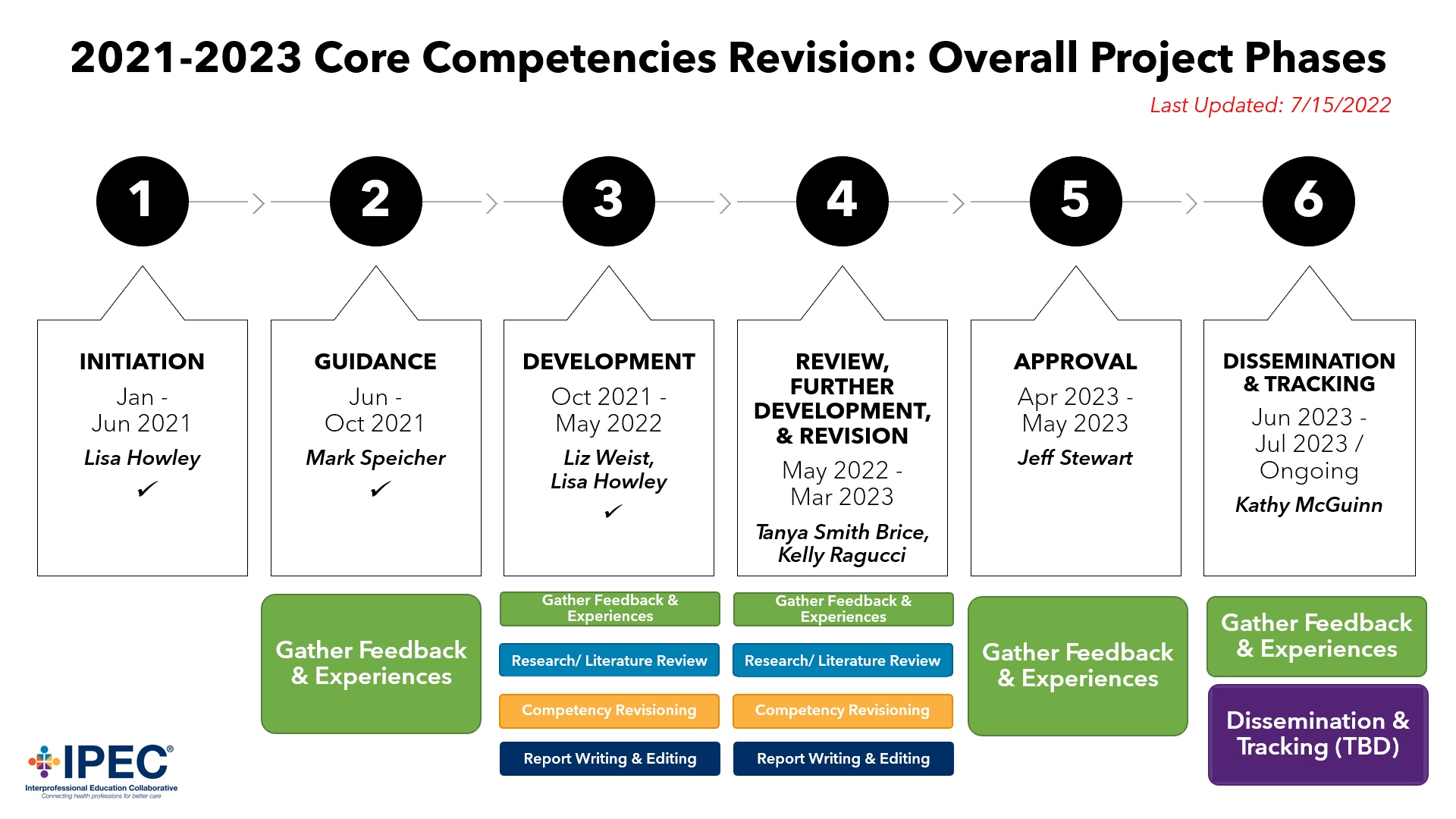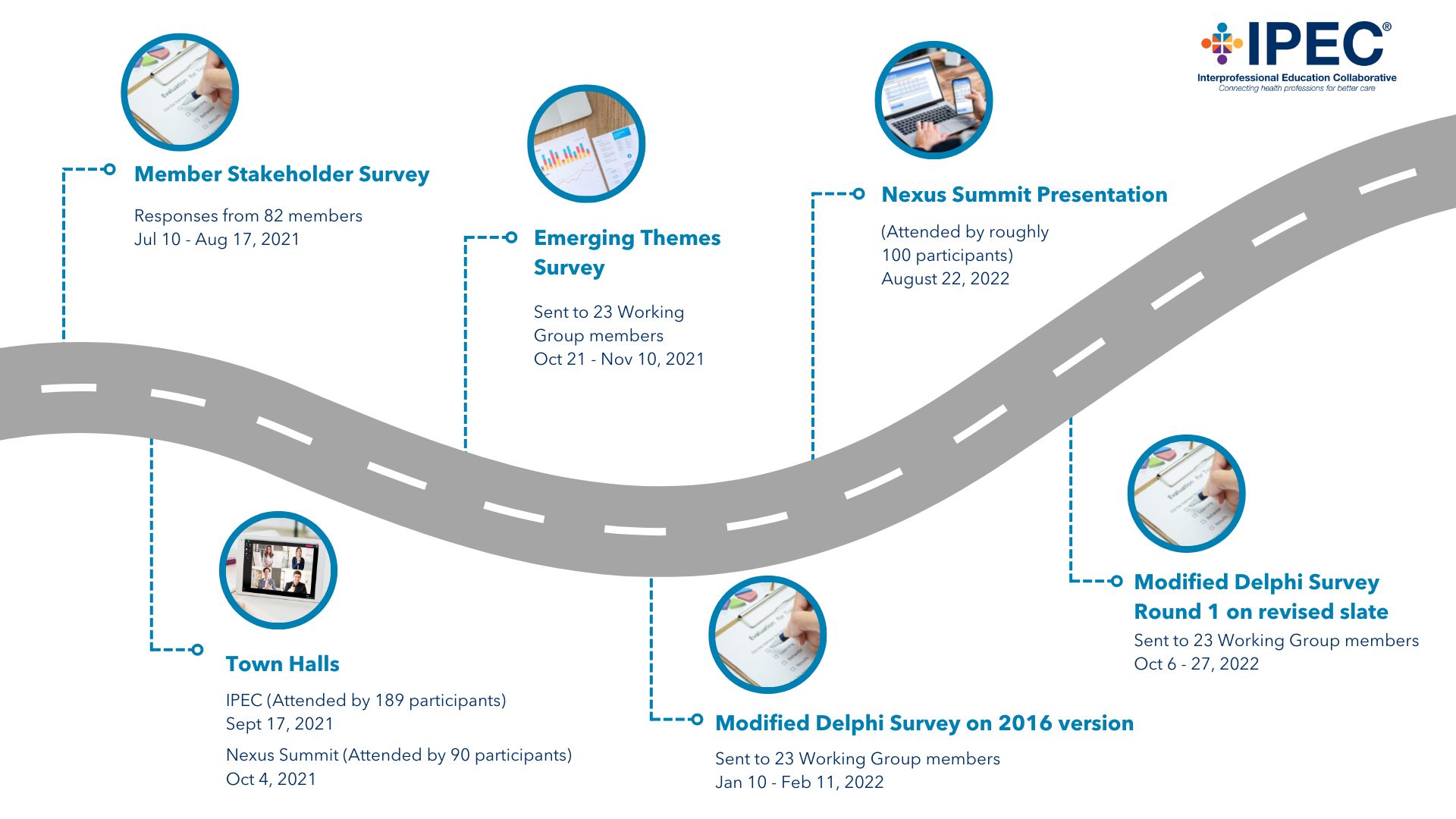- Home
- About Us
- Membership
- Newsroom
- Resources
- Events & Webinars
- IPE Collaboration Award
|
IPEC Core Competencies Revision FAQsThe Executive Board adopted a Preamble to the work of revising the core competencies for interprofessional education and collaborative practice. That preamble includes the following assumptions and tenets, which we repeat here, to provide important context for the revision efforts. The Working Group (WG) hopes you find this page helpful in providing additional information on the IPEC Core Competencies Revision. Guiding Assumptions[1]The following assumptions undergird IPEC’s interprofessional competencies:
TenetsThe forthcoming 2023 competency set is intended to:
Background of the review and revisionWho is IPEC?The Interprofessional Education Collaborative (IPEC) launched in 2009 when six national associations of schools of health professions joined to promote and encourage constituent efforts that would advance substantive interprofessional learning experiences. The goal was, and remains, to help prepare future health professionals for enhanced team-based care of patients and improved population health outcomes. The founding members, representing dentistry, nursing, medicine, osteopathic medicine, pharmacy, and public health, then convened an expert panel of representatives from each of the six IPEC sponsor professions to create core competencies for interprofessional collaborative practice, to guide curriculum development across health professions schools. In February 2016, IPEC opened its membership to nine new members. Since 2017, eight additional organizations became IPEC members to bring the current roster to 22 member associations. What associations belong to IPEC?See table of IPEC member associations and representative discplines below.
What are competencies and how are they being used in health professions education?Competencies are the integrated enactment of knowledge, skills, and values/attitudes that define the domains of work of a particular health profession applied in specific care contexts. The IPEC core competencies are designed to:
What are the IPEC Core Competencies for Interprofessional Education for Collaborative Practice and why are they being reviewed and revised at this time?The IPEC Core Competencies for Interprofessional Education for Collaborative Practice are four domains that were established with the publication of the original Core Competencies for Interprofessional Collaborative Practice in 2011. These four domains are: Values/ethics for professional practice; roles/responsibilities; Interprofessional communication; and Teams and teamwork. The domains remained the same following the Core Competencies for Interprofessional Education and Collaborative Practice: 2016 Revision, but were expanded to reflect the changes that occurred in the health system between 2011 and 2016, two of the most significant of which were the increased focus on the Triple Aim (improving the experience of care, improving the health of populations, and reducing the per capita cost of health care; revised to the Quadruple Aim which includes the health of the health care team; and the Quintuple Aim which includes the effect on health equity) and implementation of the Patient Protection and Affordable Care Act in 2010. In May 2021, the IPEC Board ordered another review and possible revision of the Core Competencies. Key drivers of the 2021-2023 revision include the need to empower the IPE community with the best current evidence and research related to IPE and CP; to regularly conduct a cyclical review on common definitions for competence, competency and the competency framework; and ensure that this framework accurately reflects any changes in research, policy, and practice. What were the outcomes of the 2016 review of the original 2011 IPEC Core Competencies?Timing: The review and revision of the Core Competencies started following the expansion of IPEC to 15 members in February 2016 and continued through the remainder of 2016. Results: The revised Core Competencies and sub-competencies feature the following desired principles: patient and family centered (hereafter termed “patient centered”); community and population oriented; relationship focused; process oriented; linked to learning activities, educational strategies, and behavioral assessments that are developmentally appropriate for the learner; able to be integrated across the learning continuum; sensitive to the systems context and applicable across practice settings; applicable across professions; stated in language common and meaningful across the professions; and outcome driven. The revised competencies were (NOTE: The 2016 updates to the competencies and sub-competencies appear in bold): Competency 1: Work with individuals of other professions to maintain a climate of mutual respect and shared values. (Values/Ethics for Interprofessional Practice) Competency 2: Use the knowledge of one’s own role and those of other professions to appropriately assess and address the health care needs of patients and to promote and advance the health of populations. (Roles/Responsibilities) Competency 3: Communicate with patients, families, communities, and professionals in health and other fields in a responsive and responsible manner that supports a team approach to the promotion and maintenance of health and the prevention and treatment of disease. (Interprofessional Communication) Competency 4: Apply relationship-building values and the principles of team dynamics to perform effectively in different team roles to plan, deliver, and evaluate patient/population-centered care and population health programs and policies that are safe, timely, efficient, effective, and equitable. (Teams and Teamwork) Process and Milestones of the Current RevisionWho is involved in the revision efforts? How were they selected?The Core Competencies Working Group comprises a panel of IPE and CP leaders and experts from across the nation, representing over 200 years of combined experience. The WG consists of a total of 23 members from all 21 IPEC member associations, including two active students in health professions programs. Each IPEC member Association used their own process for identifying nominees. Subsequently, the leadership of each member Association provided nominations and completed applications to the IPEC board for selection of one representative of each profession. A list of the IPEC Core Competencies Revision Working Group representatives can be found here. The Working Group members joined one of four workstreams as follows:
The WG will serve as the key functioning unit for the review of evidence and generation of main proposals for the revision of the IPEC Core Competencies and will work alongside an Advisory Group to provide recommendations. After the project team offers their proposals and suggestions, IPEC will work with its member organizations, external collaborators, and communities of interest on eliciting additional input and feedback. The update process is slated to begin in June 2021 with a tentative release in summer/fall 2023. Who oversees the process of this Core Competencies Revision (CCR)?The CCR process is being led by members of the IPEC Executive Board, but day-to-day leadership is provided through an eight-member Advisory Group and coordinated by the Associate Director of IPEC, Shelley McKearney ([email protected]).
What is the process for the review and revision? What are the process milestones and when are key dates?The review process began in 2021 by gathering information, including a survey, to determine stakeholders’ thoughts and attitudes toward, and use of, the 2106 IPEC Core Competencies. Using this feedback, IPEC Core Competencies Revision Working Group members reviewed outcomes data to provide feedback on suggested revisions to the competencies. Subsequently the working group members were divided into four workstreams (Gather feedback/experiences, Research/Literature Review, Competency Revisioning, and Report Writing/Editing) led by Advisory Group members to complete the specific tasks. The key steps in the process, and the involvement of the four groups, are illustrated below:
This is the most recent timeline approved by the Board, however as of July 2022 the Working Group is still engaged in the development of the competencies. This document will be updated when a revised timeline is approved. What are the opportunities to provide input or feedback?Overview presentations were given by the IPEC Core Competencies Revision Advisory Group followed by feedback solicited at town halls at a national IPEC meeting and at the Nexus Summit during Fall 2021. Presentations and drafts of competencies will be presented at Town Halls at future national meetings throughout 2022-2023, including an update at the August 2022 Nexus Summit. The timeline for surveys and feedback events is: More information is always available in the Events section which is shows on the entrance page of the IPEC website. If you have comments or questions about the Core Competencies Revision process or any of the draft documents provided by the WG for your review, the WG members have agreed to be contacted by members of their profession. What are the key accomplishments of the Working Group so far?To date, the revision has included the following efforts:
The Advisory Group meets weekly to manage this process, and the Working Group meets monthly. A number of survey results and feedback documents have been prepared and are available on IPEC Connect. What feedback have you heard from constituents and partners for updating the competencies?The key themes that have been revealed so far, through the surveys and the feedback from Core Competency users and others, are as follows:
Who is the learner target audience for IPEC’s competencies?While prior IPEC core competencies focused on the “pre-licensure/pre-credentialed student” as their target audience, the upcoming competency framework is broadened to ALL students, regardless of level, degree program, or pathway to licensure/credentialing. The rationale for this change is to cast a wide net in light of the real-world complexity of improving “equitable health outcomes” and the importance of engaging students across a variety of levels and professions in interprofessional education. Communicating the New CompetenciesHow will I know when the revision has been completed? How will the results be publicized?The Working Group plans to reach out to many external groups and users of the competencies, to get comments on the draft competencies in November 2022 – January 2023. Upon board approval of the new IPEC Core Competencies: 2023 Revision, IPEC will post the new framework on its website and disseminate it widely to partners and other potential users. How can I or my institution give feedback after the revised competencies are published?All are welcome to join our IPEC Connect community in order to get more information on how your colleagues are using the Core Competencies, to provide feedback on the competencies, and to participate in discussions and perhaps, in future revisions! A preliminary draft of proposed 2023 revisions to the IPEC Core Competencies for Interprofessional Collaborative Practice: 2016 Update is now available for open comment. IPEC highly recommends reviewing the preliminary draft along with the comparison guide and glossary of terms. Feedback can be shared by:
Feedback is welcomed on the draft 2023 Core Competencies as IPEC moves toward a revised version of the competency set this summer/fall. This draft is preliminary and the final version will be presented to the IPEC board for review and approval. Feedback is welcome through May 31, 2023. Share yours today and help shape the future of health education and collaborative practice. How can I or my institution support IPEC’s effort?We encourage you to use the current (2016) competencies and to visit this page regularly for updates on the pending 2023 revision of the IPEC Core Competencies. We also encourage you to participate in upcoming feedback sessions on the drafts of the competency domains and the competencies themselves by following the news and events on the IPEC web site. We look forward to your participation and support! [1] Adapted from: Interprofessional Education Collaborative Expert Panel. (2011). Core competencies for interprofessional collaborative practice. Report of an expert panel. Washington, DC. Interprofessional Education Collaborative, p. 2. |



